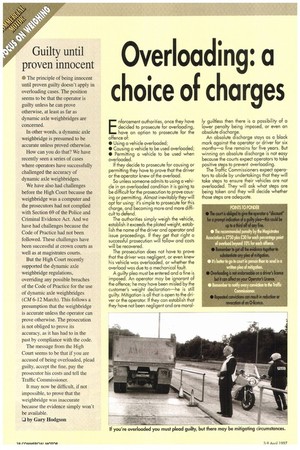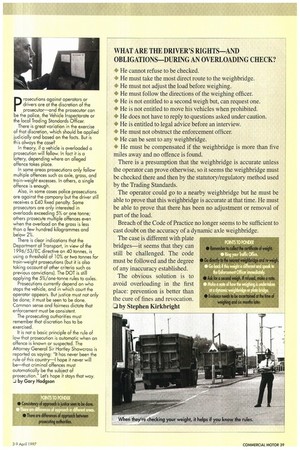Overloading: a choice of charges
Page 40

Page 41

If you've noticed an error in this article please click here to report it so we can fix it.
Enforcement authorities, once they have decided to prosecute for overloading, have an option to prosecute for the offence of: • Using a vehicle overloaded;
• Causing a vehicle to be used overloaded; • Permitting a vehicle to be used when overloaded.
If they decide to prosecute for causing or permitting they have to prove that the driver or the operator knew of the overload.
So unless someone admits to using a vehicle in an overloaded condition it is going to be difficult for the prosecution to prove causing or permitting. Almost inevitably they will opt for using: it's simple to prosecute for this charge, and becoming more and more difficult to defend.
The authorities simply weigh the vehicle, establish it exceeds the plated weight, establish the name of the driver and operator and issue proceedings. If they get that right a successful prosecution will follow and costs will be recovered.
The prosecution does not have to prove that the driver was negligent, or even knew his vehicle was overloaded, or whether the overload was due to a mechanical fault.
A guilty plea must be entered and a fine is imposed. An operator may be ignorant of the offence; he may have been misled by the customer's weight declaration—he is still guilty. Mitigation is all that is open to the driver or the operator. If they can establish that they have not been negligent and are moral
ly guiltless then there is a possibility of lower penalty being imposed, or even an absolute discharge. An absolute discharge stays as a black mark against the operator or driver for six months—a fine remains for five years. But winning an absolute discharge is not easy because the courts expect operators to take positive steps to prevent overloading. The Traffic Commissioners expect operators to abide by undertakings that they will take steps to ensure their vehicles are not overloaded. They will ask what steps are being taken and they will decide whether those steps are adequate.
prosecutions against operators or drivers are at the discretion of the prosecutor—and the prosecutor can be the police, the Vehicle Inspectorate or the local Trading Standards Officer.
There is great variation in the exercise of that discretion, which should be applied judicially and based on the facts. But is this always the case? In theory, if a vehicle is overloaded a prosecution will Follow. In fact it is a lottery, depending where an alleged offence takes place. In some areas prosecutions only follow multiple offences such as axle, gross, and train-weight excesses. In others, a single offence is enough.
Also, in some cases police prosecutions are against the company but the driver still receives a £40 fixed penalty. Some prosecutors are only interested in overloads exceeding 5% or one tonne; others prosecute multiple offences even when the overload on the gross is less than a few hundred kilogrammes and below 2%.
There is clear indications that the Department of Transport, in view of the 1996/53/EC directive on 40 tonnes, is using a threshold of 10% or two tonnes for train-weight prosecutions (but it is also taking account of other criteria such as previous convictions). The DOT is still applying the 5%/one-tonne rules to axles.
Prosecutions currently depend on who stops the vehicle, and in which court the operator appears. But justice must not only be done; it must be seen to be done. Common sense and fairness dictate that enforcement must be consistent.
The prosecuting authorities must remember that discretion has to be exercised.
It is not a basic principle of the rule of law that prosecution is automatic when an offence is known or suspected. The Attorney General Sir Hartley Shawcross is reported as saying: "It has never been the rule of this country—I hope it never will be—that criminal offences must automatically be the subject of prosecution.' Let's hope it stays that way. _i by Gary Hodgson




































































































